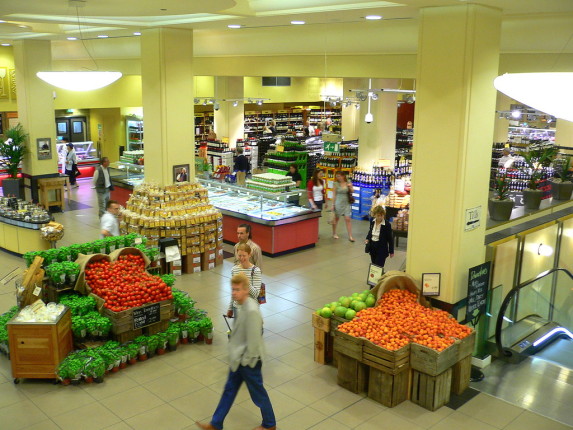-
Can Big Multinational Retailers Save Our Planet?
April 25, 2019 By Hamish van der Ven
As we move past another Earth Day, environmentalists may be forgiven for assuming that little has changed. The best available evidence points to a rapidly changing climate, declining biodiversity, and fisheries on the verge of collapse. To further complicate matters, the political will to reverse these trends is being stymied by a surge of anti-environmental populism in America, Brazil and elsewhere. When coupled with the continued harvesting of natural resources by big multinational corporations, it is easy to see why environmentalists are crying into their organic kale and quinoa bowls.
Yet ironically, the continued primacy of multinational corporations in the global economy may offer environmentalists a glimmer of hope. Big multinationals tend to source from suppliers all over the world. The far-reaching tentacles of global supply chains—the very supply chains so often accused of causing environmental degradation—might also provide humanity’s best avenue for addressing global environmental problems. Let me explain why.
Many contemporary environmental problems are caused by human consumption of food and goods. Even quinoa, that staple of the Whole Foods crowd, contributes to soil depletion from monocropping in the Andes. In the last 20 years, the global agrifood economy has consolidated, concentrating enormous power in a handful of mega multinational retailers. These companies have leverage over their suppliers around the world. The nature of their power is considerable. When a company like Walmart says, “Jump,” its suppliers say, “How high?” Or they find that they are no longer Walmart suppliers.
While the consolidation of agrifood can create unequal and exploitative relationships, it can also inject a level of hierarchy and accountability into international relations that is sorely absent from international environmental negotiations. As recent history has proven, there are few consequences for reneging on environmental treaties and fewer still for signing and then ignoring them. By contrast, farmers who fail to meet big retail’s production standards can expect profound consequences.
The same size and leverage that make big retailers powerful, also make them juicy targets for environmental groups. Naming-and-shaming campaigns hit them where it hurts: their bottom line. As a response, a growing number of retailers have taken to partnering with independent standard-setting organizations to protect their reputations by sustainably sourcing supplies from around the world. When coupled with the power of big multinational retailers over their supply chains, these independent standard-setters hold the power to create and enforce transnational rules in ways that eclipse even the United Nations.
So the upshot is this: if big retailers can be compelled to source only from suppliers that adhere to credible sustainability standards (like the Forest Stewardship Council, Bonsucro, or the Aquaculture Stewardship Council), then we may be able to achieve far-reaching environmental goals much quicker than through international negotiations.
Sounds easy, right?
Well not so fast. A key challenge remains separating credible sustainability standards from “greenwash” or fake environmental claims. Even assuming reliable methods for separating real from fake, we still face the problem of scaling up sustainability standards to cover the majority of global commodity production.
Thankfully, sustainability standards and certifications continue to gain traction. In fact, two of the largest sustainability standards for agricultural products—Rainforest Alliance and UTZ Certified—recently announced a merger. Together, the rebranded Rainforest Alliance will be a standard-setting powerhouse governing much of the 20 percent to 50 percent of global coffee, cocoa, and tea production that is currently certified.
If the rules in sustainability standards are properly written and diligently enforced, then they may hold the key to addressing some of the worst sources of environmental degradation. Of course, ensuring that good governance triumphs over greenwash will necessitate sustained pressure on independent standard-setters and their big retail partners. This means that members of the public, and especially investors, should continue to make their voices heard by demanding that their favorite stores source 100 percent independently certified goods and by getting involved in standard-setting when opportunities arise.
So take heart, environmentalists. Earth Day may have yielded few tangible outcomes, but all is not lost. While big corporations continue to exacerbate environmental degradation in a number of areas, we have an opportunity to take the very attributes that make them so destructive—their size and concern for profitability—and use them to achieve far-reaching environmental goals.
Hamish van der Ven is an Assistant Professor in the School of Environment and Department of Political Science at McGill University and the author of Beyond Greenwash: Explaining Credibility in Transnational Eco-Labeling. Follow him on Twitter @hvdv_phd.
Sources: “Beyond Greenwash: Explaining Credibility in Transnational Eco-Labeling” by Hamish van der Ven, Intergovernmental Science-Policy Platform on Biodiversity and Ecosystem Services, International Trade Centre, Proceedings of the National Academies of Sciences of the United States of America, Rainforest Alliance, Review of International Political Economy, Social Forces, The Globe and Mail, The Guardian, The Intergovernmental Panel on Climate Change
Photo Credit: Whole Foods, July 2007. Courtesy of Herry Lawford.
 A Publication of the Stimson Center.
A Publication of the Stimson Center.






